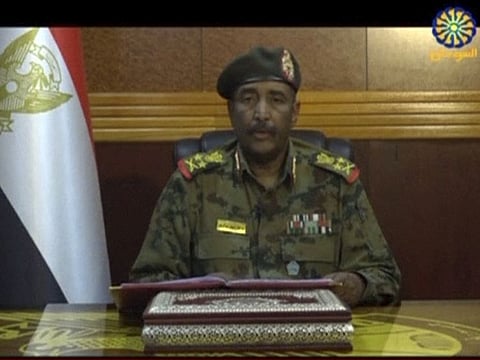Sudan’s military chief says he’s ready to resume talks
Call comes after a UN Security Council meeting urging for calm and return to dialogue

Also In This Package
Khartoum: Sudan’s military ruler on Wednesday offered to resume a dialogue on a transition to democracy, one day after he scrapped all agreements with an opposition alliance.
The offer by the head of Sudan’s ruling military council, Lieutenant General Abdel Fattah al-Burhan, came as the number of people killed since security forces stormed a protest camp in Khartoum on Monday rose to 60, according to a medical group linked to the opposition.
In a message for the Muslim Eid al-Fitr broadcast on state television, Burhan paid homage to the uprising that began in December and culminated with the military overthrow and arrest of President Omar al-Bashir in April. He was still ready to hand over power to an elected government, he said.
“We in the military council, extend our hands to negotiations without shackles except the interests of the homeland,” Burhan said.
Burhan had previously announced he was skipping any negotiations with protest groups and said he would organise elections within nine months.
Saudi Arabia deeply concerned
Meanwhile, Saudi Arabia said it was watching the developments with ‘great concern’.
"The Kingdom hopes that all parties in Sudan will choose wisdom and constructive dialogue to preserve security and stability in Sudan, protect the people of Sudan from all harm, while maintaining Sudan's interests and unity," a statement on the official Saudi Press Agency said on Wednesday.
"The Kingdom affirms the importance of resuming the dialogue between the various parties in Sudan to fulfill the aspirations of the brotherly Sudanese people."
The UN Security Council met behind closed doors on Tuesday to discuss the crisis.
Germany and Britain requested the urgent talks amid international alarm over the violence in Khartoum where security forces broke up weeks of protests against military rule.
“We need urgently a return to the negotiating table,” said German Ambassador Christoph Heusgen ahead of the meeting.
“Legitimacy cannot come from the barrel of a gun.”
The German diplomat dismissed a plan by Sudan’s military council to conduct elections within nine months, arguing that conditions were not in place for holding nationwide polls.
“Right now, to call for snap elections is to deny democracy,” Heusgen told reporters.
The military council has ruled the country since the ouster al-Bashir on April 11, following months of protests against his authoritarian rule.
Negotiations between the military rulers and protest leaders broke down over disagreements on whether a planned transitional body would be headed by a civilian or a military figure.
UN Secretary-General Antonio Guterres on Monday condemned the use of excessive force by Sudan’s security agents and said he was “alarmed” by reports that forces had opened fire inside a hospital.
The UN chief is calling for negotiations to resume on a peaceful transfer of power to a civilian-led authority.
US phones Saudi deputy defence minister
Meanwhile, top US envoy David Hale, under secretary of state for political affairs, underlined the importance of a transition to a civilian-led government in a phone call with the Saudi deputy defence minister, Khalid Bin Salman, the US Department of State said.
African and Western governments have been strongly supportive of the protesters but Arab governments, led by Saudi Arabia, have backed the military rulers.
Sudan has been rocked by unrest since December, when anger over rising bread prices and cash shortages broke into sustained protests that culminated in the armed forces removing Bashir after three decades in office.
In the build-up to the raid, talks had ground to a halt between the Transitional Military Council and the main opposition alliance — the Declaration of Freedom and Change Forces (DFCF) — amid deep differences over who would lead a transition to democracy.
Omar Al Degair, a prominent DFCF leader, said on Tuesday the two sides had been close to reaching a final deal on a plan that would have involved a 50-50 military-civilian split on a council to prepare the transition, and a rotating presidency.
The alliance has already rejected the military’s offe of elections in coming months.
The main protest organisers, the Sudanese Professionals Association, called for an international committee to investigate the deaths.
_resources1_16a4505fa02_medium.jpg?w=320&auto=format%2Ccompress&fit=max)


